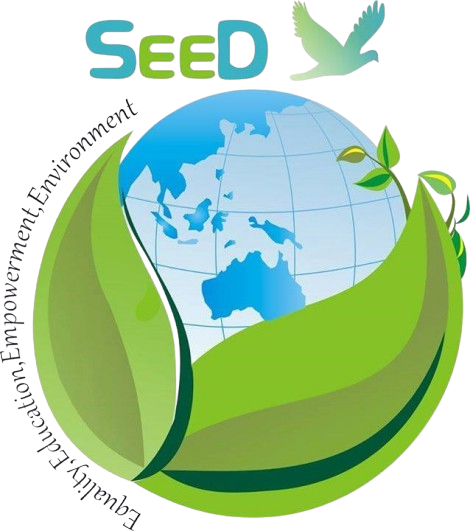





In the fragile coastal ecosystems of the Sundarbans, where communities face growing livelihood insecurity due to climate change and environmental degradation, an innovative project by SEED has turned an unlikely resource—water hyacinth—into a source of empowerment and income for hundreds of coastal women. Launched as an alternate livelihood initiative for vulnerable households, SEED’s Nature Craft Project has successfully demonstrated how sustainable use of natural resources can lead to both economic resilience and ecological benefits. Reimagining a Nuisance as an OpportunityWater hyacinth, often seen as an invasive aquatic weed choking the Sundarbans’ rivers and canals, is now a valuable resource for many local artisans. Traditionally discarded by communities, this fast-growing plant was once considered a nuisance, blocking waterways and disrupting fishing activities. Today, thanks to SEED’s initiative, it has become a symbol of creativity, entrepreneurship and hope. In collaboration with Mr. Prashanta Chowdhury, a renowned nature craft designer, SEED introduced water hyacinth-based craft training to women’s self-help groups (SHGs) in Sagar Island and other coastal villages. The training enabled women to produce a wide range of handcrafted products, including lampshades, photo frames, bags, notebooks, home décor and jewellery boxes—all using eco-friendly materials. From Pilot to Scale: A Community-Led SuccessWhat began as a pilot project with a small group of 12 women has now grown into a thriving community enterprise. Over the past two years, more than 250 women from multiple villages have been trained and are now earning regular incomes through craft production. Many of these women, who previously relied on unpredictable income from fishing and seasonal agriculture, now contribute significantly to their household earnings. One of the key strengths of the project has been its low investment model. Since water hyacinth is abundantly available in local water bodies and additional materials such as bamboo and flower petals are easily sourced, artisans can produce high-quality items with minimal costs. The training, which takes approximately six months, has equipped 250 women with the skills to manage the entire production process—from harvesting and drying the hyacinth to crafting and finishing market-ready products. Building Market Linkages and RecognitionSEED’s Nature Craft products have already gained national and international recognition. Items crafted by the trained women have been showcased at major trade fairs and exhibitions, where they received enthusiastic responses for their sustainability, creativity and cultural appeal. Some products have even found buyers in international markets such as the USA, opening up export opportunities for this grassroots enterprise. With growing demand, SEED has facilitated partnerships with ethical fashion outlets, eco-product retailers and online marketplaces. The project has also expanded into new product categories such as interior décor, wall paneling and eco-friendly corporate gifts, providing artisans with new revenue streams. Empowering Women and Strengthening CommunitiesBeyond income generation, the project has fostered social empowerment. Many participating women, who were once confined to household roles, have gained confidence, leadership skills and financial independence. Some have taken on the role of trainers, helping to scale the model to new villages and mentoring other women. Families have also benefited from diversified income sources. Youths and men, who are often busy during the day with fishing or farm work, contribute to crafting during evenings. Artistic community members now contribute unique designs and painted elements to the products adding value and appeal. Environmental Co-BenefitsIn addition to the economic gains, the project has delivered clear ecological benefits. By regularly harvesting water hyacinth, communities are helping to keep waterways clear, improving water flow and reducing breeding grounds for disease-carrying insects. The project also promotes a circular economy approach, with zero waste and minimal environmental impact. Recognizing the potential of water hyacinth beyond crafts, SEED is now exploring its use as an eco-friendly biofuel, given its high hydrocarbon content and potential for biogas production. This could further enhance energy access for remote coastal households. A Model for Scalable ImpactSEED’s Nature Craft initiative has become a proven model for climate-resilient livelihoods in the Sundarbans. It offers a replicable, community-driven solution that addresses multiple Sustainable Development Goals (SDGs)—from poverty reduction and gender equality to responsible consumption and climate action. Looking ahead, SEED plans to scale the project to additional blocks in the Sundarbans and other climate-vulnerable coastal regions. Partnerships with corporates, designers and fair-trade platforms will further strengthen the market ecosystem for these eco-friendly products. ConclusionFrom being a discarded weed to becoming a source of dignity, income and creativity—water hyacinth has shown that when communities are empowered with the right skills and support, even the most unlikely resources can drive transformative change. SEED remains committed to nurturing this growing movement and supporting the coastal communities of the Sundarbans to build resilient, sustainable futures—one handcrafted product at a time.
The tribal communities of India—among the country’s oldest inhabitants—represent a rich mosaic of cultures, languages and wisdom. Yet, they continue to be one of the most marginalized groups in terms of socio-economic development. Among them, the Munda tribe, concentrated in parts of West Bengal, faces distinct challenges in their pursuit of dignified living. Based on decades of field engagement, SEED’s work with the Munda community in Kumarpukuria Mouza, Sonarpur Block (South 24 Parganas), offers powerful lessons on how participatory, holistic development can foster resilience in tribal areas. Challenges Rooted in Exclusion Despite forming nearly 7.8% of West Bengal’s tribal population, the Munda tribe remains largely cut off from mainstream development. Their ancestral occupation as hunters and gatherers has evolved into marginal agriculture and wage labor, but landlessness, poverty, and lack of formal rights continue to define their socio-economic profile. In Kumarpukuria Mouza—comprising the villages of Jhinukpara, Kumarpukuria and Nimtala—more than 90% of the population belongs to Scheduled Tribes. The majority are marginal farmers or landless laborers, with scarce employment opportunities and seasonal incomes. Education and healthcare infrastructure are almost non-existent locally. The nearest Primary Health Centre is 10 km away and there is no school within the village itself. Tribal children, caught between poverty and parental illiteracy, often drop out or are forced into labor. Compounding this, malnutrition among children is severe—reflecting broader trends from the National Family Health Survey which highlights that nearly 60% of tribal children under five are underweight. Maternal undernutrition, poor sanitation and lack of awareness exacerbate this crisis. SEED’s Integrated Approach: from Livelihoods to Nutrition Security At SEED, we believe that sustainable change begins with livelihood security. Without improving the economic condition of families, other interventions in education or health cannot take root. With funding supported from NABARD. our first step was to form Joint Liability Groups (JLGs) among Munda households—creating solidarity-based groups for shared learning and mutual support. Recognizing the rich aquatic resources of the region, we introduced indigenous fish farming to 500 using induced breeding and bamboo pen culture techniques. Through training in the cultivation of high-demand species like Desi Magur (Clarias batrachus), we helped tribal families tap into viable market opportunities. Today, Munda women and youth are independently managing these initiatives—enhancing both their income and confidence. In parallel, we introduced animal husbandry to 800 households as an additional livelihood pathway. Ducks, goats, sheep and pigs were distributed, along with training on shelter management, disease prevention and environmental hygiene. Addressing Nutrition & Health through Community Education Recognizing the deep nutrition and health challenges faced by Munda children and mothers, SEED initiated targeted interventions in maternal health and family nutrition. Through home-based counseling, health awareness sessions, and the promotion of kitchen gardens, we empowered around 1200 Munda women to take charge of their family’s dietary diversity. Even simple innovations—like growing vegetables in old utensils, clay pots and tins—became practical solutions for improved nutrition. We also promoted safe motherhood practices—encouraging antenatal care, institutional deliveries and child health checkups—while gently challenging harmful traditional beliefs around health and nutrition. To ensure cultural acceptance, we integrated folk-based communication tools, using songs, skits and local storytelling to convey important messages in ways that echo with tribal sensibilities. A Small Step, a Long Journey Ahead Transforming entrenched poverty and marginalization is a slow process. Yet, the early results from Kumarpukuria demonstrate the power of community-led, culturally sensitive development. Tribal women now speak with confidence about their earnings, their children’s schooling, and their aspirations. Children who once dropped out are returning to school with better nutrition and family support. New conversations are emerging about land rights, literacy, and inclusive governance. At SEED, we see this as just the beginning. Our goal is to replicate and scale this integrated model of livelihoods, nutrition, education and empowerment to other tribal belts across West Bengal.
SEED, in partnership with Mahindra & Mahindra Ltd. (Farm Sector), has launched a project titled “Sashya Sphiti” in Nadia district, West Bengal under Mahindra’s Corporate Social Responsibility (CSR) initiative. The project aims to enhance mustard production by at least 10 percent through the adoption of scientific farming techniques and sustainable cultivation practices. Empowering 400 Farmers in Nadia Over a two-year period, the project directly benefitted 400 farmers from Dhubulia Gram Panchayat, located in Krishnanagar Block II of Nadia district. These farmers have traditionally practiced mustard cultivation using conventional methods, without the support of scientific inputs or modern agricultural guidance. As a result, their yields have remained suboptimal, despite high expenditures on chemical fertilizers and pesticides. Introducing High-Quality Seeds and Expert Guidance As part of the initiative, farmers were provided with “Swarnadhara”, a tried and tested variety of mustard seed known for its tolerance to pests, diseases and downy mildew. This improved variety also provided higher primary and secondary branching and matured within 100 to 110 days. The cultivation took place across 400 acres of farmland. Technical support for the project was provided by agriculture experts from Bidhan Chandra Krishi Viswavidyalaya and the Pulse & Research Station, Baharampur under the Agriculture Department, Government of West Bengal. These experts offered farmers practical training to reduce dependency on chemical inputs and improve the oil content of mustard crops—bringing it closer to the national average of 42%. Building Capacity for Sustainable Cultivation Under “Sashya Sphiti,” farmers were trained in key techniques such as soil testing, pH level assessment and proper land preparation prior to sowing. They also received carefully selected pesticides, herbicides and fertilizers. A significant focus of the project was on promoting the preparation and use of bio-compost, enabling farmers to gradually shift away from chemical fertilizers. The project adopted a Training of Trainers (ToT) model. On October 8, 2017, SEED distributed 1.5 kg of Swarnadhara seeds to each participating farmer at Dhubulia Gram Panchayat. Following this, selected farmer representatives recieved expert-led training. These trained representatives then cascaded their learnings to fellow farmers in their respective villages, fostering a self-sustaining model of knowledge sharing and community empowerment. Toward a More Resilient Agricultural Future By introducing scientific inputs, climate-resilient seeds and eco-friendly practices, “Sashya Sphiti” improved both the productivity and profitability of mustard cultivation in Nadia district. The project marks another step forward in SEED’s ongoing commitment to promoting sustainable agriculture and livelihood enhancement for smallholder farmers across West Bengal.
Tucked away in the vast delta where the Ganges, Brahmaputra and Meghna rivers meet, the Sundarbans is known worldwide for its spectacular mangrove forests and biodiversity. Yet, beneath this beauty lies a quieter crisis—one that affects thousands of young children across these fragile islands. Early childhood care remains one of the most pressing, yet underserved, development needs in this region The Silent Struggle of Early Childhood in the Sundarbans Early childhood care (ECC) in the Sundarbans is shaped by interplay of geography, poverty, climate vulnerability and social factors. Children under six here face heightened risks—malnutrition, limited healthcare, disrupted education and the trauma of displacement caused by recurrent cyclones and floods. Ghoramara Island in particular, once spanning 26 square km, has now shrunk to just 6.7 square km due to coastal erosion and rising sea levels. The island’s population has dwindled from 40,000 in the 1970s to around 5,193 today (2011 Census), with children aged 0–6 making up over 13% of this population. For these children, the first five years—a crucial window for brain development, emotional health and social skills—are often shaped by malnutrition, irregular healthcare, educational deprivation and recurring climate shocks. The Layered Challenges: Nutrition, Health and LearningIn Ghoramara and other coastal blocks, over 90% of the population are landless labourers and fishing families, with precarious incomes. The result is widespread micronutrient deficiencies and undernutrition among children. Seasonal migration further disrupts preschool attendance and poor infrastructure—including damaged Anganwadi centres—affects consistent delivery of early education. Frequent climatic shocks (cyclones, floods, erosion) also cause repeated displacement, creating a deep sense of trauma and psychosocial stress for children and caregivers. A lack of safe play spaces and structured group activities further hampers social-emotional development. The Role of Parents—and Their Struggles Parental care plays a pivotal role in a child’s development, shaping their emotional health, cognitive growth and social well-being. However, for families living in the Sundarbans, this role is often compromised by multiple intersecting challenges. Economic pressures force many parents—particularly those trapped in cycles of poverty and unstable livelihoods—to prioritise basic survival over consistent child-rearing. Migration and displacement, driven by frequent floods, cyclones and erosion, result in transient living conditions that disrupt stable caregiving environments. In addition, many parents lack awareness about early childhood development due to limited access to education and information. Deeply rooted gender norms also place a disproportionate caregiving burden on mothers, often leaving them overworked and unsupported. The stress of living in such a fragile, disaster-prone environment further heightens risks of maternal mental health challenges, which in turn can significantly affect parenting capacity and the overall well-being of young children. SEED’s "Muskaan" Project: A Comprehensive Response In response to this complex reality, SEED—supported by the SBI Foundation under the "Muskaan" Project—has launched two Early Childhood Care Centres (ECCC), one in Raypara village of Ghoramara Island and one in Radhakrishnapur village of Sagar Island. These centres aim to provide holistic support to children aged 0 to 6 years from displaced and marginalized families, creating nurturing environments that foster their growth and development. The centres offer daily nutritious meals and fortified supplements to tackle malnutrition, along with quarterly health screenings, micronutrient distribution and deworming to strengthen children’s health. Play-based, pre-primary education fosters foundational literacy and numeracy, preparing children for formal schooling. In parallel, SEED engages parents through monthly workshops on child nutrition, early learning and positive caregiving practices. Special attention is given to mothers’ mental health. Regular health check-ups, psychological counselling and targeted support are offered to help mothers cope with the stress of living in a disaster-prone environment. Trained community health workers help identify postpartum depression and ensure timely referrals and care The programme sets clear goals. Over the course of a year, SEED aims to improve cognitive and emotional resilience for at least half of the participating children through structured play, storytelling and guided interactions. It also seeks to educate 70 percent of caregivers—particularly mothers—on child nutrition, breastfeeding and positive parenting, with the goal of increasing maternal engagement by at least 15 percent. In many Sundarbans communities, maternal health services are scarce and traditional beliefs often hinder access to professional healthcare. Through this project, SEED is fostering behavioural change, encouraging mothers to seek timely medical care and embrace practices that promote better nutrition and development outcomes for their children. A Story of Change Ms. Anita Giri, a 26-year-old landless laborer from Raypara and mother of 3 years old Suman Ghosh and Ms. Durga Bhakta, a 27-year-old Lodha woman engaged in crab collection from the tribal village of Radhakrishnapur and mother to Sampa Bhakta (2.5 years) and Suman Bhakta (3.5 years), initially faced challenges in attending community meetings and Focus Group Discussions (FGDs) due to their demanding work schedules. To address this, community mobilizers adapted by conducting meetings during early mornings and late evenings, enabling the active participation of working mothers like Anita and Durga. With their children now enrolled at the SBIF Muskaan Early Childhood Care Centres (ECCCs), both mothers have not only begun participating more actively in the community activities but are also developing a deeper understanding of the importance of holistic early childhood approach—integrating nutrition, learning, physical development and mental well-being. Importantly, having a safe and nurturing space for their children during the day will allow both women to focus better on their work, without constant worry for their children’s care. Today, Anita and Durga are not only regular attendees at community meetings but have also become strong advocates for early childhood care in their villages. The other villagers from both the islands expressed great happiness and enthusiasm upon seeing the physical structure of the SBIF- Muskaan. They appreciated the welcoming space created for their children and wholeheartedly committed to supporting the centre’s activities through their active participation. Laying Foundations for a Resilient Future The "Muskaan" project adopts an integrated approach to early childhood development, combining nutrition, health, psychosocial support, parental education and school readiness—all tailored to the unique realities of climate-affected Sundarbans communities. We believe that early investment in childhood care can help break the cycle of poverty and vulnerability for these families. By addressing both the immediate needs of children and the structural gaps that perpetuate disadvantage, we can ensure that children in the Sundarbans grow up with the nurturing care, dignity and opportunities they deserve. We remain committed to learning, adapting and scaling this model across other climate-vulnerable blocks—because in a region where the tides are rising, the resilience of the next generation must rise even higher.
Showing Blogs 1 to 4 of 4



Subscribe to the SEED Newsletter — and be part of the change!